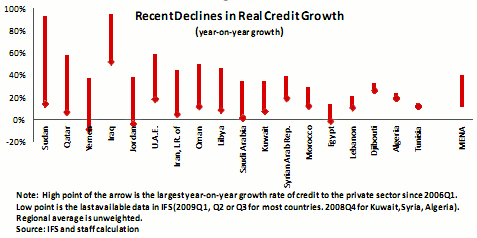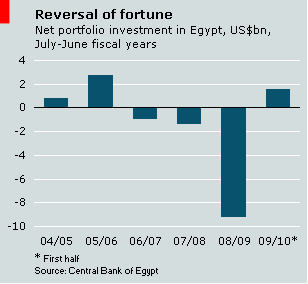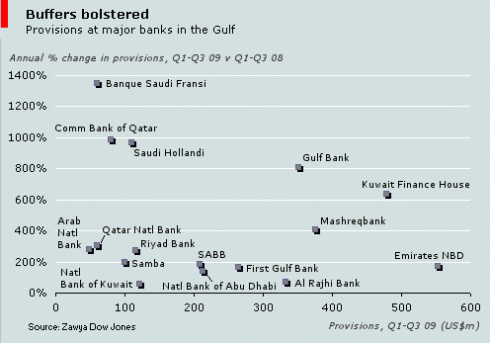You are currently browsing the tag archive for the ‘Middle East’ tag.
Following the overthrow of Zine el-Abidine Ben Ali’s government in Tunisia, attention has turned to regimes with similar characteristics in the region.

Investors in Egypt are nervous. The Cairo bourse’s benchmark index fell by around 6% in the week following Mr Ben Ali’s departure, with foreign investors particularly heavy sellers. The Egyptian pound and credit default swaps on government debt have also come under pressure this week.
Bargain hunters edged back into the stock market today, driving a modest rally. This, and recent commitments from large companies to boost direct investment in Egypt, suggests that the recent turmoil is a “a re-rating of assets instead of a fundamental reassessment of exposure to the country”, according to a story over at the parent site.
A working paper from the IMF investigates recent trends in bank lending in the Middle East and North Africa (MENA). The title says it all: “Recent Credit Stagnation in the MENA Region: What to Expect? What Can Be Done?”
Although focused on MENA, the paper presents a useful history of the frequency, scope and magnitude of recent credit booms (and subsequent busts) in a number of regions. For MENA itself, the authors make a few policy suggestions to limit the impact of future credit crises. Ultimately, they conclude, developing local debt markets as an alternative to bank lending will go a long way to bolstering financial systems in the region: “While pronounced bank credit cycles may be difficult to avoid in their entirety, their impact on economic activity might be lessened with a more diversified financial system”.

The majority of data and analysis at Financial Services Briefing is available only to subscribers. Each week, a small share of content from the service is made available to non-subscribers.

Fears about the strength of the global economic recovery have sent investors piling into bonds, and Islamic debt is no exception. The yield on a broad-based index tracking sukuk, or bonds that conform to the Islamic prohibition against interest, recently reached lows not seen since late 2005, according to HSBC, a bank, and Nasdaq Dubai, an exchange operator.
Following the high-profile restructuring of sukuk issued by Dubai’s teetering conglomerates, as well as several outright defaults by borrowers elsewhere in the Gulf, does Islamic debt deserve the safe-haven status that current rock-bottom yields imply?
Yes and no. The scarcity of Islamic bonds is as important a factor in explaining the recent rally as is their safe-haven appeal.
Read more at Financial Services Briefing: “Desperately seeking sukuk” (August 23rd)
The majority of data and analysis at Financial Services Briefing is available only to subscribers. Each week, a small share of content from the service is made available to non-subscribers.

Investors are growing more enthusiastic about the Middle East and North Africa (MENA) region, argues a story from ViewsWire, a sister service of Financial Services Briefing. The recent launch of a new MENA equity fund by Barings Asset Management, with a large share of holdings in the financial sector of Egypt, Turkey and Abu Dhabi, is indicative of the trend.
Share prices—especially for lenders—have been depressed by Dubai’s debt crisis, offering plenty of upside potential if the region’s longer-term growth prospects can be believed. Complicating matters are restrictions on foreign investments, patchy regulatory regimes and a history of wrenching volatility in many MENA markets. There is little doubt that the region offers enticing opportunities for investors, but these are “limited in range and carry a high degree of risk,” ViewsWire argues.
Read more at Financial Services Briefing: “Investors enthused” (March 4th)
As the dispute between two of Saudi Arabia’s largest corporate conglomerates rumbles on, the strain on lenders in the Gulf—reportedly owed US$10bn by the groups—is showing. Already burdened with sour loans from a burst property bubble, the extra uncertainty over unpaid debts is unwelcome, to say the least.
Abdul Aziz al Ghurair, chief executive of Dubai-based Mashreqbank, one of the worst hit by the Saudi dispute, predicted recently that the region’s banks will not be “back and kicking” until 2011. Given the sharp rise in loan-loss provisions at local lenders this year—helpfully compiled by Zawya Dow Jones—that looks like a safe bet, a rare thing in the region these days.


